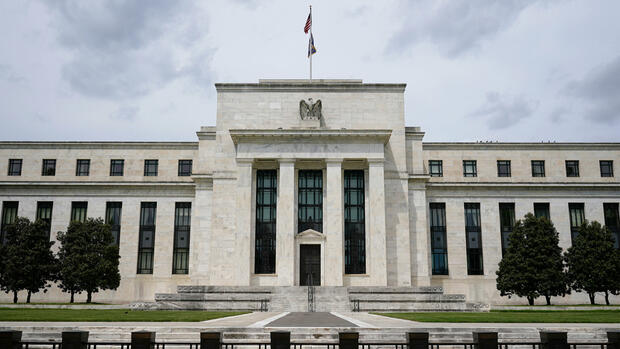It is likely that the Fed will hike rates for the last time on Wednesday.
(Photo: AP)
Frankfurt Will we see the interest rate peak this week? That’s the question investors are asking ahead of Wednesday’s Federal Reserve (Fed) and Thursday’s European Central Bank (ECB) meetings. And the question may also remain open after the meetings if the central bankers don’t let themselves be looked at.
The central banks have been raising interest rates at record speed since last year in order to combat inflation. It is almost certain that the Fed and the ECB will now each raise rates by another 25 basis points (a quarter of a percentage point). It is just as certain that the peak in interest rates, at least for the Fed, will be “almost” reached, as the Allianz experts write.
In the past year, interest rate hikes up until the fall put bond and stock prices under pressure. When monetary policy tightens, yields rise.
Because yield is defined as interest in relation to price, higher yields automatically mean lower prices for all securities that are still on the market at the old conditions. And in the case of equities, prices are depressed because bonds are becoming more attractive in relative terms.
Equities in particular have recovered well since the fall, anticipating the end of interest rate hikes. The market is now in an unstable equilibrium: Any hope of an end to interest rate hikes strengthens prices, while any indication of further increases puts them under pressure.
The alliance notes that the Fed is further along in fighting the rise in prices. After all, inflation fell to around three percent in June, compared to four percent in May. Another interest rate hike in the fall is “cannot be ruled out”, but Allianz ultimately assumes that the US Federal Reserve will take its last step this week, but then maintain the high interest rates for a while.
The ECB is under much greater pressure, they say. Because most recently, the so-called core inflation in the euro zone, which excludes the strongly fluctuating prices for energy and food, even increased slightly to 5.5 percent.
Against this background, ECB President Christine Lagarde cannot compromise. Allianz therefore expects another interest rate step at least in September and even considers further increases to be possible. She warns that investors may have underestimated further monetary tightening by the ECB.
Expert: Monetary policy not reason for fall in inflation
Monetary policy often acts quickly on the markets, but with a lag of up to a year on the real economy. In fact, Allianz believes that about half of the decline in US inflation is not at all Fed-related. The other half is mainly due to the fact that supply bottlenecks have been eliminated.
Robin Brooks, chief economist at the major banking organization IIF in Washington, even warns that the decline in inflation is only slightly due to the tightening of monetary policy, the effects of which are still largely pending. Brooks therefore warns, like former ECB Vice President Vitor Constancio, for example, that monetary policy is unnecessarily restrictive and will trigger a recession.
The experts do not differ with their forecasts for further steps by the Fed and the ECB. Deutsche Bank, for example, believes that Fed Chair Jerome Powell will hold back on further rate hikes. He will probably point out that after the increase on Wednesday everything else depends on the incoming data.
>> Read here: A year of interest rate reversal in six charts – where the tighter monetary policy is particularly noticeable
The US investment company PGIM assumes that the Fed will take a break after Wednesday and very slowly lower it again from the beginning of next year. At the same time, she warns that Powell could make comments about the persistence of inflation and thus put prices under pressure. The central bank has no interest in high exchange rates because, conversely, this means that financing for companies becomes cheaper, which strengthens the economy and thus inflation again.
In a current study, the US fund company T.Rowe Price emphasizes that the ECB will not be impressed by the recently relatively weak economic data in the euro area. On Monday, the so-called purchasing manager indices for the euro area gave clear signals of a recession. If core inflation does not fall significantly and unemployment does not rise noticeably, another rate hike can still be expected in September, they say.
More: ECB – The journey into the unknown

